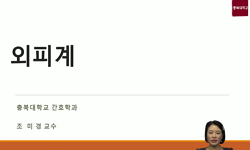Purpose: Since 2016, the Korean Triage and Acuity Scale (KTAS) algorithm has been applied to the triage process in the emergency departments (EDs) of Korea. This study aimed to investigate the facilitators of and barriers to a well-run triage function...
http://chineseinput.net/에서 pinyin(병음)방식으로 중국어를 변환할 수 있습니다.
변환된 중국어를 복사하여 사용하시면 됩니다.
- 中文 을 입력하시려면 zhongwen을 입력하시고 space를누르시면됩니다.
- 北京 을 입력하시려면 beijing을 입력하시고 space를 누르시면 됩니다.




Facilitators and Barriers of the Triage Process based on Emergency Nurses’ Experience with the Korean Triage and Acuity Scale: A Qualitative Content Analysis
한글로보기https://www.riss.kr/link?id=A108065390
- 저자
- 발행기관
- 학술지명
- 권호사항
-
발행연도
2021
-
작성언어
English
- 주제어
-
등재정보
KCI등재,SCOPUS,SCIE,SSCI
-
자료형태
학술저널
-
수록면
255-264(10쪽)
-
KCI 피인용횟수
0
- DOI식별코드
- 제공처
-
0
상세조회 -
0
다운로드
부가정보
다국어 초록 (Multilingual Abstract)
Purpose: Since 2016, the Korean Triage and Acuity Scale (KTAS) algorithm has been applied to the triage process in the emergency departments (EDs) of Korea. This study aimed to investigate the facilitators of and barriers to a well-run triage function based on how Korean emergency nurses perceived the triage process and their experiences with it.
Methods: Data were collected using focus group interviews from June 2018 to January 2019. Twenty emergency nurses were divided into two junior and four senior groups based on their level of clinical experience. All interviews were recorded as they were spoken and transcribed. Data were analyzed using qualitative content analysis.
Results: The participants recognized the need for the KTAS algorithm to efficiently classify emergency patients and were working on it properly. According to the data, we extracted 4 themes and 20 subthemes. Four themes were as follows: (1) awareness about the necessity of triage, (2) facilitators to triage process, (3) barriers to triage process, and (4) suggestions for the establishment and development of triage.
Conclusion: From the findings of this study, various vulnerabilities of the triage process were identified, and solutions were suggested from the emergency nurses’ perspective. Educational, staffing, financial support, and periodic updates of the KTAS are needed to promote the triage process in the future.
참고문헌 (Reference)
1 박준범, "한국형 응급환자 분류도구의 이해" 대한응급의학회 28 (28): 547-551, 2017
2 손행미, "질적내용분석의 이해와 적용" 대한질적연구학회 2 : 56-63, 2017
3 김효진, "웹기반 한국형 중증도 분류 체계 학습프로그램이 응급실간호사의 중증도분류에 대한 자기효능감 및 수행능력에 미치는 효과" 한국간호과학회 49 (49): 171-180, 2019
4 장금성, "간호사의 임상경력개발 모형구축에 관한 연구" 연세대학교 대학원 2000
5 Chang W, "Using the five-level taiwan triage and acuity scale computerized system : factors in decision making by emergency department triage nurses" 26 (26): 651-666, 2017
6 Wolf LA, "Triaging the emergency department, not the patient : United States emergency nurses' experience of the triage process" 44 (44): 258-266, 2018
7 Reay G, "Triage emergency nurse decision-making : incidental findings from a focus group study" 48 : 100791-, 2020
8 Moon SH, "Triage accuracy and causes of mistriage using the Korean Triage and Acuity Scale" 14 (14): e0216972-, 2019
9 Hitchcock M, "Triage : an investigation of the process and potential vulnerabilities" 70 (70): 1532-1541, 2014
10 Hsieh H-F, "Three approaches to qualitative content analysis" 15 (15): 1277-1288, 2005
1 박준범, "한국형 응급환자 분류도구의 이해" 대한응급의학회 28 (28): 547-551, 2017
2 손행미, "질적내용분석의 이해와 적용" 대한질적연구학회 2 : 56-63, 2017
3 김효진, "웹기반 한국형 중증도 분류 체계 학습프로그램이 응급실간호사의 중증도분류에 대한 자기효능감 및 수행능력에 미치는 효과" 한국간호과학회 49 (49): 171-180, 2019
4 장금성, "간호사의 임상경력개발 모형구축에 관한 연구" 연세대학교 대학원 2000
5 Chang W, "Using the five-level taiwan triage and acuity scale computerized system : factors in decision making by emergency department triage nurses" 26 (26): 651-666, 2017
6 Wolf LA, "Triaging the emergency department, not the patient : United States emergency nurses' experience of the triage process" 44 (44): 258-266, 2018
7 Reay G, "Triage emergency nurse decision-making : incidental findings from a focus group study" 48 : 100791-, 2020
8 Moon SH, "Triage accuracy and causes of mistriage using the Korean Triage and Acuity Scale" 14 (14): e0216972-, 2019
9 Hitchcock M, "Triage : an investigation of the process and potential vulnerabilities" 70 (70): 1532-1541, 2014
10 Hsieh H-F, "Three approaches to qualitative content analysis" 15 (15): 1277-1288, 2005
11 Rowe BH, "The role of triage liaison physicians on mitigating overcrowding in emergency departments : a systematic review" 18 (18): 111-120, 2011
12 Ebrahimi M, "The role descriptions of triage nurse in emergency department: a Delphi study" 2016 : 2016
13 Satu Elo, "The qualitative content analysis process" Wiley 62 (62): 107-115, 2008
14 Sandelowski M, "The problem of rigor in qualitative research" 8 (8): 27-37, 1986
15 Rozo JA, "Situational factors associated with burnout among emergency department nurses" 65 (65): 262-265, 2017
16 Genly B, "Safety and job burnout : understanding complex contributing factors" 61 (61): 45-49, 2016
17 The National Emergency Nurses Association, "Role of the triage nurse" National Emergency Nurses Association
18 Mayring P, "Qualitative content analysis" 1 (1): 20-, 2000
19 Jung KY, "Pediatric triage in emergency department" 5 (5): 347-355, 1994
20 Catherine T. Recznik, "Pediatric triage education: An integrative literature review" Elsevier BV 44 (44): 605-613.e9, 2018
21 Morse JM, "Nursing research: the application of qualitative approaches" Nelson Thornes 103-139, 1995
22 Mistry B, "Nursing perceptions of the emergency severity index as a triage tool in the United Arab Emirates : a qualitative analysis" 44 (44): 360-367, 2018
23 Ingo Gräff, "Nurse Staffing Calculation in the Emergency Department - Performance-Oriented Calculation Based on the Manchester Triage System at the University Hospital Bonn" Public Library of Science (PLoS) 11 (11): e0154344-, 2016
24 Korean Triage and Acuity Scale committee, "Korean triage and acuity scale manual" Koonja 1-83, 2017
25 Korean Triage and Acuity Scale(KTAS) Committee, "KTAS Curriculum Introduction" The Korean Society of Emergency Medicine KTAS Committee
26 Evans C, "Improving patient safety through the introduction of a formal triage process" 24 (24): 19-25, 2017
27 Krueger RA, "Focus groups: a practical guide for applied research" Sage Publications, Inc 63-81, 2009
28 Kuriyama A, "Five-level emergency triage systems : variation in assessment of validity" 34 (34): 703-710, 2017
29 Janssen MA, "Factors influencing the implementation of the guideline triage in emergency departments : a qualitative study" 21 (21): 437-447, 2012
30 Emergency Nurses Association, "Emergency severity index implementation handbook" Emergency Nurses Association
31 Emergency Nurses Association, "Emergency nursing core curriculum" Elsevier Saunders 1-768, 2018
32 Emergency Nurses Association, "Emergency nurses association acquires ESI triage program schaumburg"
33 Atack L, "Effectiveness of a 6-week online course in the Canadian Triage and Acuity Scale for emergency nurses" 31 (31): 436-441, 2005
34 Guba EG, "Effective evaluation" Jossey-Bass 1981
35 Edwards TA, "Art of triage" Nova Science Publishers 1-86, 2014
동일학술지(권/호) 다른 논문
-
- 한국간호과학회
- Park Jin-Hee
- 2021
- KCI등재,SCOPUS,SCIE,SSCI
-
Development and Validation of an Instrument for Measuring Parenting Stress among Clinical Nurses
- 한국간호과학회
- 이경미
- 2021
- KCI등재,SCOPUS,SCIE,SSCI
-
Self-care Experiences of Adolescents with Spinal Muscular Atrophy
- 한국간호과학회
- Bao-Huan Yang
- 2021
- KCI등재,SCOPUS,SCIE,SSCI
-
- 한국간호과학회
- 홍경진
- 2021
- KCI등재,SCOPUS,SCIE,SSCI
분석정보
인용정보 인용지수 설명보기
학술지 이력
| 연월일 | 이력구분 | 이력상세 | 등재구분 |
|---|---|---|---|
| 2023 | 평가예정 | 해외DB학술지평가 신청대상 (해외등재 학술지 평가) | |
| 2020-01-01 | 평가 | 등재학술지 유지 (해외등재 학술지 평가) |  |
| 2008-01-01 | 평가 | 등재학술지 선정 (등재후보2차) |  |
| 2007-12-18 | 학술지명변경 | 한글명 : Journal of Korean Academy of Nursing -> Asian Nursing Research외국어명 : Journal of Korean Academy of Nursing -> Asian Nursing Research |  |
| 2007-01-01 | 평가 | SCOPUS 등재 (신규평가) |  |
| 2006-08-25 | 학술지명변경 | 한글명 : -> Journal of Korean Academy of Nursing | |
| 2006-08-25 | 학술지등록 | 한글명 : 외국어명 : Journal of Korean Academy of Nursing | |
| 2005-02-25 | 학회명변경 | 한글명 : 대한간호학회 -> 한국간호과학회영문명 : Korean Academy Of Nursing -> Korean Society of Nursing Science |
학술지 인용정보
| 기준연도 | WOS-KCI 통합IF(2년) | KCIF(2년) | KCIF(3년) |
|---|---|---|---|
| 2016 | 0.74 | 0.3 | 0.64 |
| KCIF(4년) | KCIF(5년) | 중심성지수(3년) | 즉시성지수 |
| 0.57 | 0.51 | 0.749 | 0.02 |




 KCI
KCI






